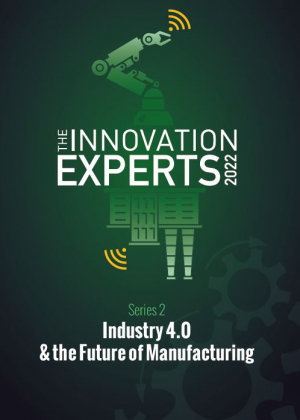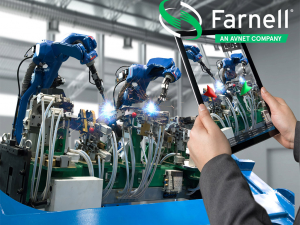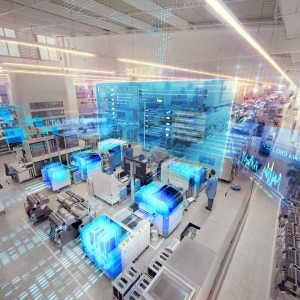Universal automation: a necessity for post-Brexit Britain?

The tumult of 2020 has underscored the importance of contingency planning. With COVID-19, countries have revealed their unpreparedness when managing novel scenarios. With the reality of Brexit now upon us, UK industry, particularly manufacturers, need to act fast to minimise long term impact.
By Mark Yeeles, VP of Industrial Automation at Schneider Electric
Early 2021 will see British manufacturers begin to action specific strategies. It will be the first opportunity to assess the true impact of Brexit on production and supply chains. In the wake of a pandemic, and in the face of political uncertainty, how can the industry adapt, survive and thrive?
How the industry will be impacted
2021 will see a levelling of the playing field. Even established manufacturers, historically immune to market fluctuations and supply chain disruptions, will suffer the impact of uncertainty. New global dynamics and fully digital newcomers, poised to embrace digital technologies, will challenge the status quo.
The double-edged sword of Brexit means UK manufacturers will have more visibility - and more competition - on the global stage. For our industry to succeed, agility, sustainability, productivity and profitability must be the standard. In 2021, the reality of Brexit’s effect on the cost of business operations, the optimum locations for plants and factories, as well as the retention of staff and resources will be revealed.
As Britain’s trade deal with the EU takes a different direction, our success will actually be more reliant on an extended ecosystem of partners. 2021 will see workforce management become critical to operations. There will now be a pressing need for businesses to find alternative ways of performing tasks for which they have a shortage of either staff or resources, to guarantee that their business continues to thrive. This is where automation comes in.
After 1st January, businesses will have a clearer understanding of which operations need automation, the level of automation required, and which technologies should be prioritised for success.
Introducing and adopting next-generation industrial automation will make this possible, ensuring interoperability and breaking free from the propriety locked-in model currently in place. Manufacturers will need to welcome a new era of universal automation with open arms, moving the industry from a hardware-centric to software-centric model to succeed in these turbulent times.
Looking ahead
Reshaping post-Brexit Britain will deliver huge benefits if it’s coupled with greater ambition from industry. While manufacturers may find this challenging, it’s the perfect environment for universal automation to come to the fore and prove critical for those willing to adopt it.
Universal automation describes the adoption of a common standard for all automation systems, making them easy to pick up, implement and share. It removes the dependence that many manufacturers currently have on a one vendor system, OEMs and integrators, enabling end users to build the architecture they need with the best ‘plug and produce’ solutions from multiple providers.
To fully realise the next generation industries alongside the new challenges that Brexit will bring, manufacturers need to fundamentally change their technology model. The adoption of universal automation will enable manufacturers to create a step-change in operational improvements capable of keeping up with the speed of doing business and remaining competitive in the global market.
With manufacturers facing ongoing changes as a result of political uncertainties and constantly shifting consumer needs in the wake of Brexit and the 2020 pandemic, the adoption of universal automation will provide safety and certainty to the sector. Industry siloes and vendor lock-in must be eliminated, with equipment interoperability and data-driven insight boosting the industry’s agility, profitability and resilience. At a time when the manufacturing industry is in desperate need of future proofing, resilience building technologies, industrial automation offers a much-needed solution.
Over the course of 2021, as we see more businesses move from a proprietary world to universal automation, the benefits will be far reaching. It won’t just be end users who reap the rewards of an automated approach - it will give an edge to all who are willing to transform and embrace the value of software innovation.
As automation systems become more flexible and capable of providing end user value, we will see the beginnings of a virtual circle where investment in automation systems will increase. New business models will be enabled, new customers reached, and new markets served, reshaping post-Brexit, post-pandemic Britain for the better. This approach will bring changes across the entire operational lifecycle of industrial enterprises and will ultimately leverage digitalisation to fully realise the potential of Industry 4.0.
Readiness through innovation
After the year we’ve had, many of us are eager to see the back of 2020 and welcome 2021. However, with the uncertainties that the next year brings, it could be a daunting time for industry.
We have little control over the implications of Brexit and other crises, nor can we predict what the next challenge may be. However, the opportunity to prepare and build resilience is very much in our control and has the power to make or break us. By moving the industry from a hardware-centric to software-centric model, universal automation will usher in a new dawn for industrial automation. With challenge comes innovation and with innovation comes new opportunity.
Similar articles
More from Schneider Electric SA
- A green recovery powered by digital and electric 26th April 2021
- Industrial automation with EcoStruxure Automation Expert v21.0 17th February 2021
- Universal automation: a necessity for post-Brexit Britain? 11th December 2020
- What makes the Supply Chain of Tomorrow? 30th September 2020












Write a comment
No comments